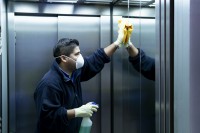Amazon Bans Use of its Facial Recognition Software by Police for One Year

As advanced technologies become more pervasive across society, it’s becoming more difficult for companies to remain neutral on pressing social issues. Facial recognition has been criticized for reinforcing existing prejudices, so it’s not surprising that some tech firms are distancing themselves from it.
“Amazon said on Wednesday that it’s banning use of its facial recognition software by police for one year, as pressure on tech companies builds to respond to the killing of George Floyd by a police officer in Minneapolis,” write Ari Levy and Lauren Hirsch of CNBC. “Amazon’s announcement comes two days after IBM said it was exiting the facial recognition business, with CEO Arvind Krishna calling on Congress to enact reforms to advance racial justice and combat systemic racism.
Mobile Apps Make Contact Tracing Easier

As more parts of the world move to reopening their economies, many are relying on contact tracing to prevent a resurgence of the pandemic. Traditional methods of contact tracing are slow and laborious, however, and tech companies are stepping in to accelerate the process. Soon, it may seem normal to “shake” with our mobile phones instead of our hands.
“Google and Apple have a partnership underway to develop software for smartphones that would enable them to continuously log information from other devices. The MIT Media Lab has built contact tracing technology too. Three states — Alabama, North Dakota and South Dakota — have said they have deployed or are developing apps for tracking the virus,” writes Matt Richtel of the New York Times.
Richtel’s article is worth reading, since it seems likely that tech leaders and executives will be tasked at some point with selecting contact tracing tools for their companies and organizations.
Hotels Now Competing on Cleanliness

I’m including this item because so many of us have been frequent business travelers. I’m not exactly certain when we’ll all be traveling again routinely for business, but my hunch is that it will be relatively soon. When we do return to traveling, however, we’re likely to find some changes in our accommodations.
“Marriott, Hilton and other big hotel companies are used to competing on price or perks. Now they are competing on cleanliness,” writes Dee-Ann Durbin of the Associated Press. “Hilton and other companies have called in experts to develop new standards. Marriott and IHG — the parent company of Holiday Inn — are working with EcoLab, which makes industrial cleaning products. IHG is also getting advice from the Cleveland Clinic. Hilton has partnered with the Mayo Clinic. Hyatt is working with ISSA, a global cleaning industry association.”
From my perspective, the shift in focus makes sense. Travelers want to feel safe, and the hotels are trying to assure guests that their safety is a top priority
Sometimes Old Tech is Better than New Tech

When aviation legend Kelly Johnson designed the U-2 spy plane in the 1950s, he could hardly have imagined that it would still be flying missions today. During the Cold War, the U-2 was considered a marvel of technology, and apparently it still is.
“Today the U-2’s high-altitude capability, adaptable design and relatively low development cost have poised it for a new role: the 65-year-old craft is set to become a vital node in an ambitious network named the Advanced Battle Management System, which will connect weapons and sensors in space, at sea, underwater, in the air and on land,” writes Eric Tegler of Scientific American. “Its combination of high-altitude flight capability and range still exceed those of most modern tactical and command-and-control aircraft, making it a more effective intelligence gatherer and data ‘node’—a high-capacity channel for passing along the information its sensors collect.”


